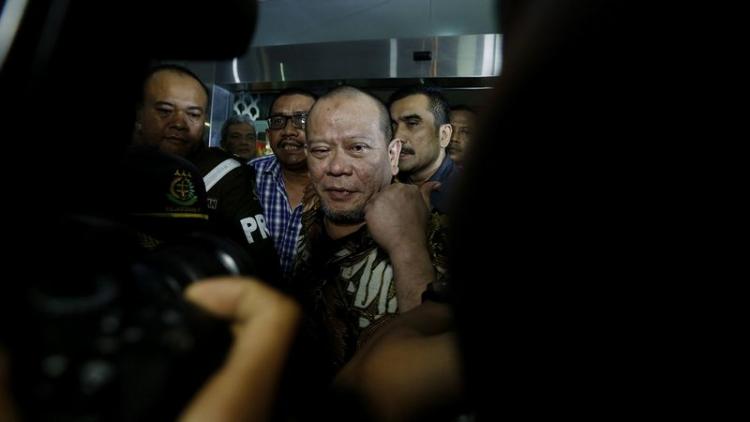The Case against Chief Justice’s Nephew

Among the piles of corruption cases in the hands of the Attorney General Office, the litigation involving La Nyalla Mataliti – Chairman of PSSI, the Indonesian Football Association – would be the most intricate that attracts most public attention. La Nyalla was named as suspect by the Provincial Attorney General (Kejati) of East Java on March 2016 for his involvement in money laundering of 2011-2014 grant funds from the East Java Chamber of Commerce (KADIN), causing IDR 5.3 billion of state loss.
Still, to charge La Nyalla, himself a former Chairperson of KADIN in East Java, as a suspect of corruption turned out to be no easy feat thanks to his tenacious resistance. The tasks of Kejati in East Java bring him to trial was countered La Nyalla’s defense team with three successful pre-trial appeals in a row, on March, April and May 2016. Despite his legal status as a fugitive after he allegedly fled to Singapore, pre-trial judges continue to favor his appeals.
Out of these three pre-trial rulings at the State Court of Surabaya, the one administered by Principal Judge Mangapul Girsang on Monday (23/5) was seen as the most controversial. Judge Girsang took no account of the fact that the appeal was filed on behalf of La Nyalla’s son, Muhammad Ali Affandi. Moreover, not only that he ruled the investigation against La Nyalla to be invalid, the judge also declared the travel ban imposed upon him by the Immigration Office as well as the blocking of his bank accounts to be unlawful.
La Nyalla’s treble drubbing of state prosecutors at the pre-trial courts were actually predicted beforehand by Kejati of East Java. Chief of Kejati Maruli Hutagalung suspected that these rulings favored La Nyalla due to interference from ‘central people’, despite his reluctance to spell out who he meant by 'people from the capital'.
Although Maruli fell short of naming who interfered to have the rulings favor La Nyalla, many suggested that he was referring to Hatta Ali, Chairman of MA -the Supreme Court- who had admitted that La Nyalla is his nephew. The Chief Justice consequently denied having any hand to interfere in the case and asked not to be associated with the case implicating his nephew.
The litigation against La Nyalla Mataliti, nephew of Chief Justice Hatta Ali, now becomes even more interesting for observation. First of all, the pre-trial mechanism has become an increasingly utilized medium by corruption suspects to wriggle free from litigation and invalidate their status as suspects. The pre-trial of La Nyalla could not be separated from the 2015 ruling of the Constitutional Court that expanded the objects of pre-trial as regulated in Article 77 paragraph (a) of Law No. 8 of 1981 about Criminal Proceedings. As of last year, pre-trial objects are no longer limited to lawfulness of arrest, detention, termination of investigation or prosecution, but also lawfulness of naming of suspect as well as search and seizure.
Attempts by suspects of corruption to escape litigation using pre-trial mechanisms need to be perused since this would definitely hamper the campaign to combat corruption. By now, pre-trial court is generally seen as the “fourth court” since it often stray too far in its examination and tends to examine the principal case materials and evidence, which are the domains of the Corruption Court. Along with La Nyalla, other corruption suspects that had escaped corruption trials and revoke their status as corruption suspects using pre-trial courts include Commissioner Gen. Budi Gunawan – now Deputy Chief of the Police Force – and Hadi Purnomo, former General Director of Taxes. Both had corruption charges against them dropped by KPK, the Corruption Eradication Commission.
Second, the granting of pre-trial appeal for a corruption suspect that fled the country – as was La Nyalla before being deported by Singapore – provides a detrimental judicial precedent against the corruption eradication agenda. The case would be a bad example that opens the opportunity for fugitive suspects to get themselves acquitted. After their pre-trial appeals are granted and their status as suspects invalidated, corruption suspects can walk away as free citizens before the litigation against them even commenced.
In order to address both these concerns, as well as to avoid political intervention and to guarantee a fair trial against the nephew of the Chief Justice, it would be advisable for KPK to supervise Kejati of East Java in handling this case. Should there be any indication of intervention or unprofessionalism, then KPK should promptly takeover investigation and prosecution. Afterwards, when the case would be handed over to the Corruption Court, both KPK and the Judicial Commission would also need to keep tabs on the judges overseeing the case to ensure a thoroughly fair ruling. On the other hand, the Chief Justice himself is recommended to issue a Supreme Court Directive that essentially prevent judges from granting appeals from suspects that tried to flee from justice.***










